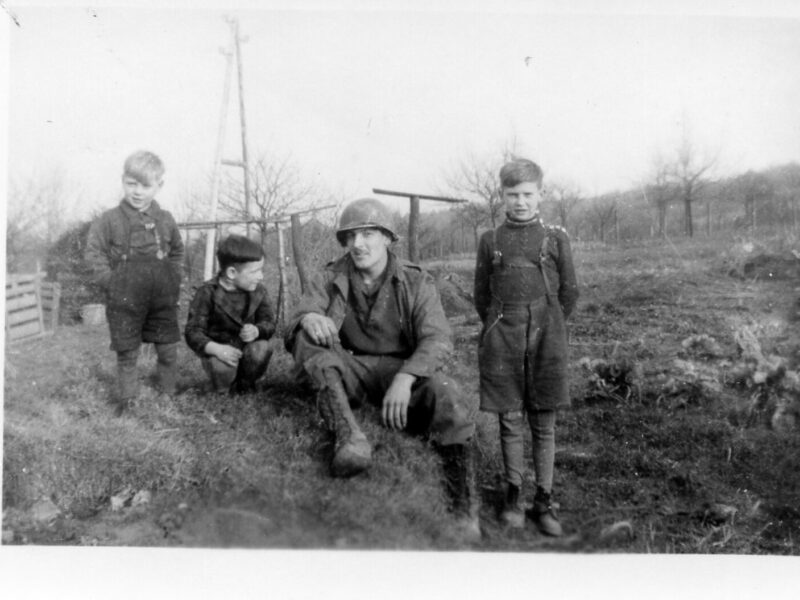

By Mary Ann Mulvihill-Decker
A remarkable and multi-faceted man, Sag Harbor native and my father, William Patrick Mulvihill, would have celebrated his 100th birthday earlier this summer. Our family honored this special date and remembers him with tremendous love and pride.
Known locally as Bill, my dad was born at the McDonough homestead on Glover Street and grew up at “The Brickilns,” what we called “The Farm” and now is officially The Anna and Daniel Mulvihill Preserve, named for my grandparents, who purchased the house and land in 1920.
Thanks to the Community Preservation Fund and the foresight of environmental and community leaders, the land was purchased from Bill’s sister, Dolores Zebrowski, by Southampton Township for habitat and groundwater protection. The William Mulvihill Preserve, adjacent to that land, was similarly saved.
My father and his sister understood the critical value of wetlands, vernal ponds and aquifer protection, particularly on an island. They educated others about the many large birds that need unbroken tracts of mixed woodland in order to nest.
Bill told everyone who would listen about the rare Doll’s Eye flower and the endangered tiger salamanders that existed in the delicate and beautiful forest. He appreciated the vital importance of the billions of unseen organisms and diverse species that inhabited his homeland.
Bill and Dolores spent years working to ensure its preservation. Their success now benefits not only our local biodiversity and our air and water quality but our entire community, which now has open access to over 120 acres that had been private land throughout the entire 20th century.
My father’s legacy, however, is not limited to environmental protection.
Along with the very many Sag Harbor men and women who enlisted to serve in World War II, Bill joined the U.S. Army in 1942. After being stationed at Camp Upton, New York, and Fort Bragg, North Carolina, he entered officer’s training in Durham, New Hampshire, in 1943.
As the war intensified, though, fighting men were needed before he could complete the program, and he found himself at Camp Pickett in Virginia. Here, he became a sharpshooter, learned to survive outside and gained the needed skills of a soldier. He was already extremely fit from swimming at Long Beach and from cutting and chopping wood to heat the farmhouse. Soon, he was even stronger and anxious to get overseas to help stop the evil madness of the Third Reich.
He met my mom, Mary, when he “cut in” at a dance in Durham; soon, they were engaged and writing letters almost daily. He wrote on September 29, 1944: “Dearest Lovelyone … Our love is so unique, so great, so uncommon that nothing can withstand it … I’m just existing until the day when at last we are married and never have to part.”
Military letters became censored the very next day. His ship left for England in mid-October. He was in France by Thanksgiving, in Belgium by early December, and in Germany by Christmas.
He had taken German at Pierson High School and continued studying it in college. His language skills and sharp intellect stood out, and he became an interpreter and forward observer in Belgium and Germany in the 78th Artillery Division.
During the horrific winter that ensued, he survived one day at a time, often on the front lines. The unforgiving cold of the Hϋrtgen Forest and in the Ardennes that winter was something he mentioned throughout his life. The unspeakable brutalities of Nazi Germany and violence of the war, he did not.
In a letter to Dolores, then an RN in the Army, dated May 19, 1945, he wrote: “We started on December 11 and were pulled about two weeks before V-E Day. We took Schmidt and the Roer Dams and were the first full division across the Rhine. Then we were in on cleaning up the Ruhr pocket. After taking Wuppertal, we were relieved. We are getting two campaign stars and perhaps a third for the Bulge.”
His letters to my mom continued throughout the war. They are extremely romantic, intelligent and historic. He shared stories of intriguing people he had met, elaborate descriptions of ruined towns and ancient castles, and his opinions about many ongoing issues of the day. He expressed concern about his brother Dan, who was still on the front lines as a medic in the Pacific.
Most frequently, he penned entreaties of undying love and his yearnings and promises for their future together. In June 1945, he wrote: “The only thing I’m sure of in this world is you, Mary. You are the one thing I can count on. Most people take being together for granted, but all we have ever known is goodbye. Before you know it, the war will be over and we’ll be together forever.”
After the European hostilities ended, Bill remained in Germany with the Army of Occupation. In addition to securing town after town of all manner of items that could be used against them, the Americans assisted throngs of displaced persons.
His compassion and integrity shine through the worn 78-year-old pages of my mom’s carefully protected letters. Germans surrendered to him in significant numbers. Russian and Polish slaves presented themselves to my father and his unit for help.
Not infrequently, he had to exert discipline over corrupt mayors who were not feeding or housing refugees. He insisted on food and clean beds inside houses for the displaced people and then followed up forcefully to ensure they were complying.
By November 1945, he was studying in Biarritz, France, at the Army’s American University. He wrote to his mother, Anna: “Thanks a lot for the food. I’ll eat some and give the rest to our club. On Christmas Eve, we are going around to some of the Orphan homes and hospitals and giving it out … I feel really sorry for the skinny little kids and people who haven’t had a square meal in years.
“It makes me mad to read about talk of the distrust between the U.S. and other countries and the stupid people in the states who are trying to drum up more trouble.”
The dreams he shared with my mother came true. He returned and married Mary Marceau, finished his degree at Cornell, moved to the city, got his master’s at Columbia and became a high school teacher specializing in African history, a subject dear to his heart.
Teaching allowed him the free time to write. He needed to write. The words and ideas inside of him could not be withheld. His first novel, “Fire Mission,” was about the war.
He continued to write almost every day throughout his long life. “The Sands of Kalahari” became a Paramount Picture in 1965. “The Mantrackers,” “Night of the Axe” and “I’ve Got Viktor Schalkenburg” were all highly acclaimed. He wrote many self-published novels as well, including his masterpiece, “God Is Blind,” based on a true accounting of the slave trade.
His later titles include “Serengeti,” “Meadow Lane,” “Sagaponack,” “Eva,” “Boyfriend” and “Wrackline.” His experiences in the war imbued him with a far-reaching knowledge of human nature enabling him to create dramatically insightful stories and complex characters. He witnessed the very worst and the very best of human impulses.
His last piece, published posthumously in The Sag Harbor Express, was entitled “The Stone Fleet,” detailing Sag Harbor’s involvement in the attempted blockade of the harbors of Charleston, South Carolina, and Savannah, Georgia, during the Civil War.
Bill frequently wrote for the “Our Town” column of this paper over many years. He also published several editions of his very popular book “South Fork Place Names” based on his years of local research and enduring love of Sag Harbor and East End history.
Bill loved to travel, especially to Ireland. Based on his paternal grandfather’s Irish birth in Clonmoylan, Woodford, County Galway, he became a dual citizen and received his Irish passport. Always proud of his Irish heritage, he initiated an international gathering and reimagining of the Mulvihill Clan for modern times.
Sadly, he passed away suddenly from pancreatic cancer mere months before the clan reunion. Mulvihills from England, Australia and from many counties in Ireland attended, as well as several Americans. They gathered on what would have been his 82nd birthday. This became yet another of his legacies, for Clan Mulvihill continues as a vibrant organization to this day, with members on five continents.
My mom, Mary, is now 99 years old, and she brightens as I read her the tender words she cherished so very long ago. I am moved beyond measure; I never could’ve appreciated my parents’ sacrifices and the depth of their love as I do now, having at last read the beloved letters, wrapped ever so tenderly in delicate white ribbons.
Ready to die at any moment to liberate Europe from fascism and to defend democracy with his own precious young life, his heart was overflowing anyway with love and promise. Mary waited and waited, as they both wrote back and forth every day that they possibly could, while she finished college and prayed in her deepest heart for his survival.
Bill and Mary were married for 58 years. He always said their relationship was one of the greatest love stories of all time.
Now I truly believe it.
Mary Ann Mulvihill-Decker is a resident of Sag Harbor.
 More Posts from Viewpoint
More Posts from Viewpoint